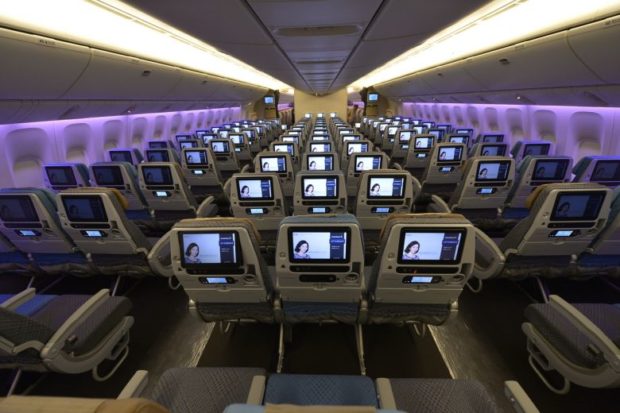Singapore requires planes flying in and out of country to set up quarantine areas to isolate unwell passengers

The lavatory closest to the quarantine area must also be reserved for those who are unwell. The Straits Times/Asia News Network/ALPHONSUS CHERN
SINGAPORE — All planes flying in and out of Singapore are now required to set up an emergency quarantine area by blocking off a section of seats on board, as part of measures to minimize passengers’ risk of exposure to Covid-19.
The Civil Aviation Authority of Singapore (CAAS) told The Straits Times that passengers or crew who become unwell with fever or any Covid-19 symptoms during a flight must be moved to the quarantine area and be isolated from other passengers.
The lavatory closest to the quarantine area must also be reserved for those who are unwell.
Singapore Airlines (SIA) has set up such zones in the last three rows of seats on the left side of its planes. Any SIA crew member serving the ill person on board will also have to wear full personal protective gear.
Similarly, budget carrier Jetstar Asia has set up the zones in the last three rows of seats on either the left or right side of the plane.
The isolation zone requirement was publicized this month when Jetstar Asia said that it has set up isolation zones on its planes, among other measures, to guard against the spread of Covid-19.
Mr Alan Foo, acting senior director of the safety regulation group at CAAS, said the authority had mandated the quarantine area on board planes in May.
“To minimize the risk of exposure to Covid-19 during their journeys, safe travel measures have been put in place for all flights operating into and out of Singapore,” he added.
“These measures have been developed by the CAAS in close consultation with Singapore’s Ministry of Health.”
These measures also include requiring passengers to wear masks throughout flights and having those flying to Singapore take a basic health assessment before boarding the plane.
Meal services on board have been modified to reduce contact between crew and passengers.
On whether CAAS would make the emergency quarantine zones a permanent measure, Mr Foo said the authority will review the measures when necessary given the evolving nature of the Covid-19 pandemic.
Infectious diseases expert Leong Hoe Nam said CAAS’ decision to require the quarantine zones is a sensible one that will effectively limit the exposure of an unwell passenger to others.
He said reserving an on-board toilet for use by an unwell passenger will also remove another potential mode of virus transmission.
“While the high-efficiency particulate air filters on planes work in refreshing the air inside the cabin, there is still a risk of transmission to passengers sitting within three rows in front or behind an infected passenger,” added Dr Leong.
“If you stay outside the zone, you remove the risk.”
The mandatory quarantine zone goes a step beyond international guidelines on isolating an unwell person while in flight.
According to the International Air Transport Association (Iata), in the case that a passenger or crew member becomes unwell on board, an airline should try to relocate adjacent passengers such that there is a space of 2m between them and the unwell person.
Should there be no seats available, Iata recommends that the airline give personal protective equipment to adjacent passengers. It also recommends several other precautions, such as storing soiled items from the unwell person in a biohazard bag.
Independent aviation analyst Brendan Sobie from Sobie Aviation said that countries need to work together to standardize safety requirements to help the aviation sector recover. For example, the lack of uniform regulations within Asean is hampering efforts to restart travel within the region, he said.
“The issue is that every country has different requirements… It’s disappointing that after so many months, we still do not have convergence for this requirement and many others,” added Mr Sobie.
“It’s important as the industry is trying to reboot international travel but when you have different regulations in every country, it makes it so difficult for airlines.”
For more news about the novel coronavirus click here.
What you need to know about Coronavirus.
For more information on COVID-19, call the DOH Hotline: (02) 86517800 local 1149/1150.
The Inquirer Foundation supports our healthcare frontliners and is still accepting cash donations to be deposited at Banco de Oro (BDO) current account #007960018860 or donate through PayMaya using this link.